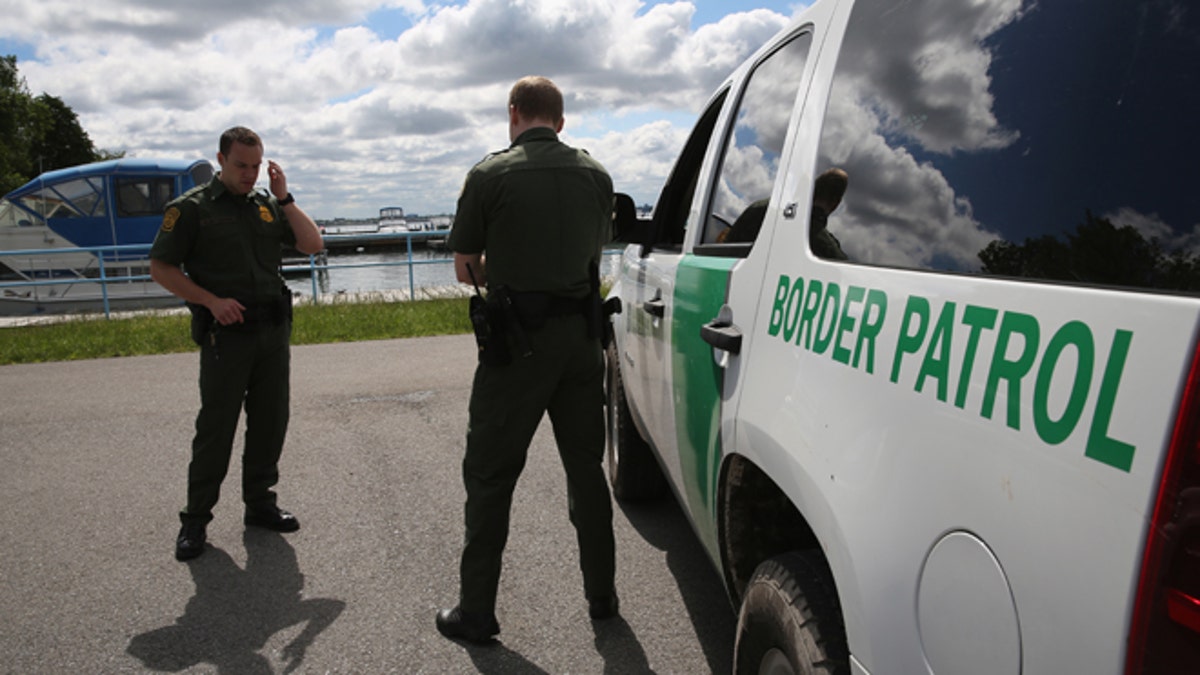New rules make it tougher for Border Patrol Agents to abuse overtime pay
{{#rendered}} {{/rendered}}
BEAVER ISLAND STATE PARK, NY - JUNE 03: U.S. Border Patrol agents talk while at a marina on the Niagara River at the U.S.-Canada border on June 3, 2013 in Beaver Island State Park, New York. U.S. Customs and Border Protection, which includes the Border Patrol, monitors the 5,525 mile long border, including Alaska, forming the longest international border between two countries in the world. (Photo by John Moore/Getty Images) (2013 Getty Images)
Pretty soon U.S. Border Patrol agents won't be able to pad their paychecks by clocking in for overtime, according to new rules released by the Department of Homeland Security's (DHS) Office of Personnel Management.
The new rules are part of a crackdown on a system of widespread abuse by agents who clocked in for overtime while commuting, exercising or just lounging at their desk watching movies or scrolling the Internet in a way to way their paychecks in what was known as the "candy bowl."
The federal Office of Special Counsel found that some DHS employees were using Administratively Uncontrollable Overtime, known as AUO, to add up to 25 percent to their paycheck and has become so ubiquitous in the agency that it was even offered as a perk when government managers tried to recruit new employees.
{{#rendered}} {{/rendered}}In light of these pay offenses, the 2014 Border Patrol Agent Pay Reform Act will go into effect on Jan. 1, 2016 and do away with AUO.
The report described the AUO abuse as a "profound and entrenched problem" at DHS and a "gross waste of government funds," with the reform hoping to save the U.S. government $100 million a year, according to the Washington Post.
The new law will make Border Patrol agents choose to work a selection of three levels during a two-week pay period: Level one has agents working 100 hours and earning an overtime "supplement" that equals 25 percent of their normal base pay; at level two, employees work 90 hours and earn 12.5 percent of their basic pay for the extra one hour of overtime per day; and at level three agents work 80 hours a week and earn no overtime.
{{#rendered}} {{/rendered}}The new pay system has upset many border agents and leaders in its union, who say that the strictures on overtime are hurting morale among the ranks.
‘‘No Border Patrol agent is happy about the prospect of losing $6,400 per year," said Brandon Judd, president of the National Border Patrol Council at a Senate hearing in June 2014, according to Government Executive. "We are sacrificing a lot, but in the end, it will prove to be a boon for border security, the American public, the agency and the agents whom I represent."
President Obama signed into law a bill clarifying that Border Patrol agents should continue to receive overtime pay until the new system goes into effect next year, but seems to have done little to appease CBP agents.
{{#rendered}} {{/rendered}}"Make no mistake, we will continue to hold OPM's and DHS's feet to the fire to protect our members' interests and financial security," the Border Agents' union said in a statement to the Washington Post.
